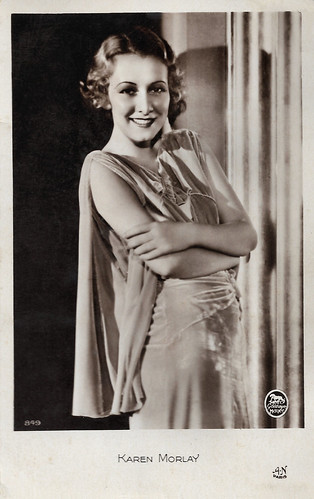
French postcard by A.N., Paris, no. 849. Photo: Metro-Goldwyn-Mayer.
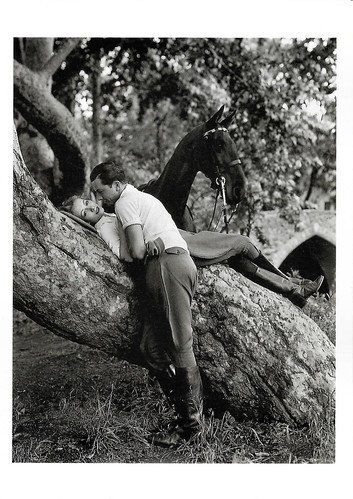
British postcard by Foto-Roff in the Black & Whites Gallery, London, no. 1198. Photo: Kobal Collection. Karen Morley and boyfriend Robert Young, 1932.

British postcard by Film Weekly. Photo: M.G.M. Franchot Tone and Karen Morley in Gabriel over the White House (Gregory La Cava, 1933).

Spanish postcard by Dümmatzen, no. 63. Photo: Metro Goldwyn Mayer.

British Art Photo postcard, no. 127. Photo: Paramount Pictures.
Rehearsal replacements for Greta Garbo
Karen Morley was born Mildred Linton in Ottumwa, Iowa in 1909. As a child, she was adopted by a well-to-do family who moved to California during the 1920s. She attended Hollywood High School and studied for a career in medicine at UCLA, but a class in theatre changed her career ambitions. Karen dropped out of college to join the Los Angeles Civic Repertory Theatre and the Pasadena Playhouse.
At the Pasadena Playhouse, she was discovered by director Clarence Brown when he was looking for rehearsal replacements for Greta Garbo. He cast her alongside Garbo and Robert Montgomery in the drama Inspiration (Clarence Brown, 1931).
Howard Hughes chose her for the role of blond moll Poppy in Scarface (Howard Hawks, Richard Rosson, 1932) starring Paul Muni. She received a contract with Metro-Goldwyn-Mayer and was selected as one of the WAMPAS Baby Stars in 1931. That year, she married director Charles Vidor and had a son with him, Michael Karoly.
Her other films included The Mask of Fu Manchu (Charles Brabin, 1932) with Boris Karloff, the mystery Arsene Lupin (Jack Conway, 1933) starring John Barrymore, the political fantasy Gabriel Over the White House (Gregory La Cava, 1933), and the all-star comedy drama Dinner at Eight (George Cukor, 1933).
In 1934, Morley left MGM after arguments about her roles and private life, including her intention to start a family. King Vidor entrusted her with the leading role in his New Deal propaganda film Our Daily Bread (1934). She continued to work as a freelance performer and appeared in Michael Curtiz's Black Fury (1935) with Paul Muni and The Littlest Rebel (David Butler, 1935) with Shirley Temple. She only appeared in a few films from this time onwards, as it was difficult to make a film career at that time without the backing of a major film studio.

Dutch postcard, no. 472. Photo: Metro-Goldwyn-Mayer. Karen Morley and Charles Starrett in The Mask of Fu Manchu (Charles Brabin, 1932).

Dutch postcard, no. 510. Photo: Metro Goldwyn Mayer. Nils Asther and Karen Morley in Washington Masquerade (Charles Brabin, 1932). The card holds the stamp of the Dutch National Board of Censors. The Dutch title of the film was Hoog Spel (High Stakes).

British postcard by Film Weekly. Photo: M.G.M. Walter Huston, Karen Morley and Franchot Tone in Gabriel over the White House (Gregory La Cava, 1933).
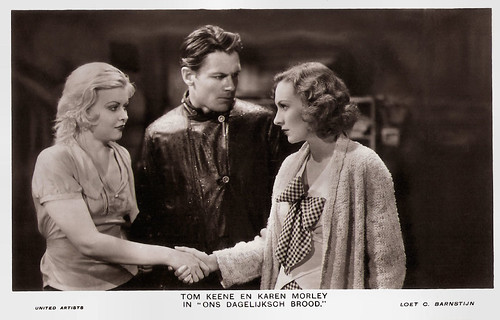
Dutch postcard by Loet C. Barnstijn. Photo: United Artists. Barbara Pepper, Tom Keene and Karen Morley in Our Daily Bread (King Vidor, 1934).
Blacklisted by Hollywood
Karen Morley played Charlotte Lucas, Mr. Collins' wife, in Pride and Prejudice (Robert Z. Leonard, 1940). The film was critically well-received, but it did not advance her career. Morley turned her attention to the stage and acted in three plays on Broadway in 1941 and 1942. In 1943, she divorced Charles Vidor to marry actor Lloyd Gough. The couple remained married to him until he died in 1984.
In 1947, she was called to the HUAC (House Committee on Un-American Activities) because she was suspected to be a member of the Communist Party of the United States. She refused to answer questions and, as a result, ended up blacklisted by Hollywood. Her final films were the Film Noir M (1951) directed by Joseph Losey, who was also blacklisted, and the Western Born to the Saddle (William Beaudine, 1953).
Later, she made brief appearances in the TV series Kung Fu (1973), Kojak (1973) and Police Woman (1975). Morley did not manage to get any more film roles, but she remained active in politics. In 1954, she ran for lieutenant governor of New York for the American Labor Party but was unsuccessful.
In 1993, she appeared in The Great Depression, a documentary TV series. In the series, she talked about how helpless she felt as a privileged Hollywood actress in the face of all the poverty and suffering that surrounded her. She also spoke of her experience making Our Daily Bread and working for King Vidor, whom she described as a conservative who thought that people should willingly help each other without government interference.
In December 1999, at the age of 90, she appeared in Vanity Fair in an article about blacklist survivors, and she was honoured at the San Francisco Film Festival. In 2003, Morley seemed to make a comeback when she was offered a role in the black comedy Duplex (Danny DeVito, 2003) starring Drew Barrymore. However, Karen Morley died of pneumonia at the Motion Picture Country House in Woodland Hills, Los Angeles, at 93.
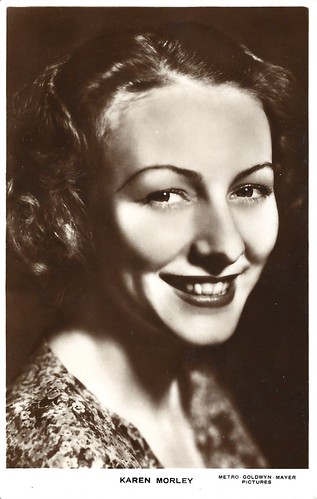
British postcard. Photo: Metro-Goldwyn-Mayer Pictures.

British postcard in the Film-Kurier Series, London, no. 10, Photo: Metro-Goldwyn-Mayer, no. 56.
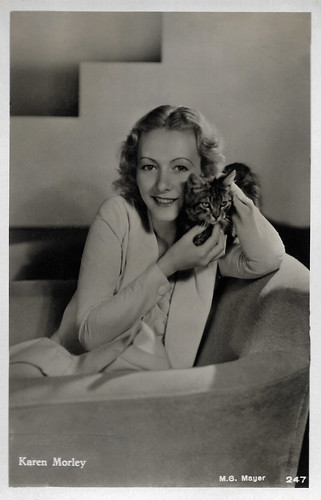
Dutch postcard, no. 247. Photo: Metro-Goldwyn-Mayer.

Belgian postcard by P.I.A. Belga Phot., Bruxelles, no. 76. Photo: Metro-Goldwyn-Mayer.
Sources: Wikipedia (Dutch, German, French and English) and IMDb.
No comments:
Post a Comment